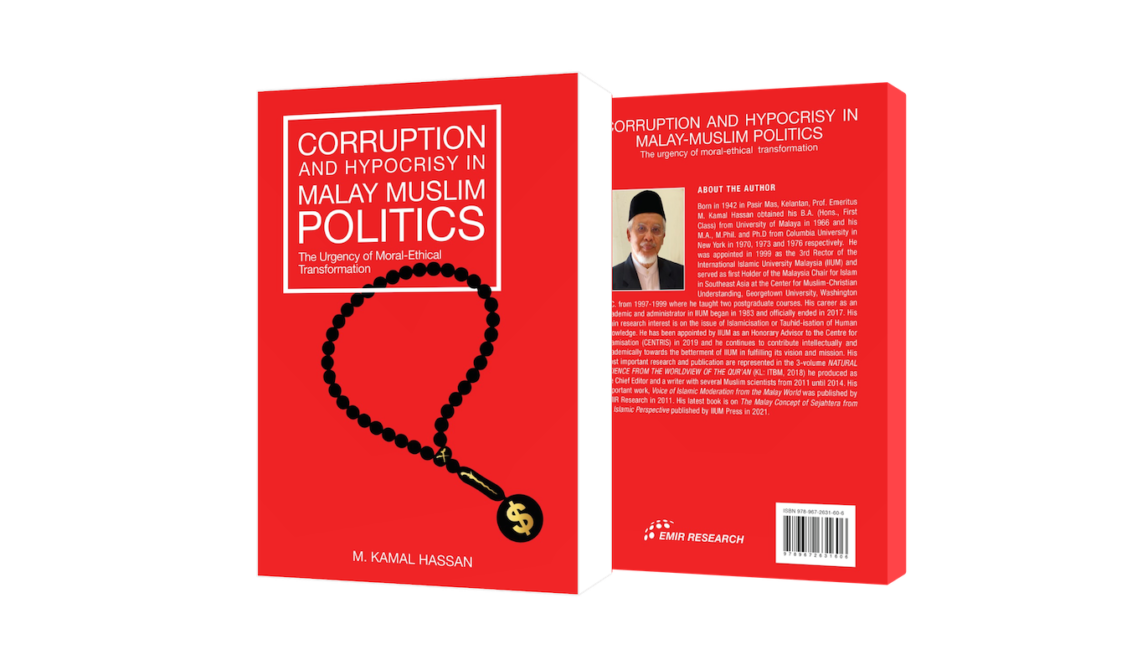
EMIR Research’s official media release:
Launch of a sorely needed book by prominent Malaysian scholar — Prof. Emeritus Tan Sri Dr. Mohd Kamal Hassan
Driven by his perception of serious moral decay in the arena of politics and governance of Malaysia and the widening internal rifts within the Malay-Muslim community in the country, Professor Emeritus Tan Sri Dr. M. Kamal Hassan expresses not only his deep disappointment but even a sense of shame in the new book “Hypocrisy and Corruption in Malay-Muslim Politics: The Urgency of Moral-Ethical Transformation” which he authored.
In the book, Prof. M. Kamal Hassan touches on how the agenda of national integration has been trampled under the boots of ugly ethnoreligious polarisation, hypocritical narratives, and worrying direction of national politics which is reversing the intended outcome and worsening political instability.
The author emphasised how racially-motivated political strategies and ethnic-based prejudices will continue to drive hostility on both sides of the Malaysian political divide, and highlighted the blatant hypocrisy when those prejudices are camouflaged by both sides invoking the rhetoric of national interest, virtues of national unity, economic equity, democratic principles or universal human rights.
Prof. M. Kamal Hassan condemns how political bribery, corruption or economic threats are used to augment the promotion or preservation of a particular ethnic community’s interest, bringing to light the existence of sinister underground agents of financial seduction or coercion for the purpose of maintaining “the black economy” or to secure a demographic advantage in some strategic political constituencies.
Being a truly non-partisan Muslim spectator of political events, the author is attempting to reach out to decent and sincere Malay-Muslim political leaders and followers who share the same sentiment regarding the current political turmoil and moral decay, providing practical ideas, guidelines, and frameworks for a serious rethinking of Malay Muslim political ecosystem as well as a serious soul-searching and self-introspection.
The author considers the research work, constructive criticisms and suggestions in the book as a “self-criticism with zero vested interest” in the hope of providing an impactful and effective way to achieve socio-political transformation of the community, leading to major improvements and reforms in Malay-Muslim political behaviour and culture as well as Islamic political solidarity, cooperation and unity.
The author succinctly mentions the following quotes from the book, reflecting his thoughts on the matter:
“Looking at the phenomenon of political corruption and hypocrisy in Malay-Muslim political behaviour and culture, I believe it is symptomatic of an inner crisis of the leaders and the followers of the political parties: the moral decay as a consequence of several factors, including the impact of materialistic modernisation, the pragmatism of political parties, the materialistic and egoistic character of key political leaders, the lack of proper and sound moral-ethical education in political parties, the fear of the rise of non-Muslim political dominance, and the impact of the secularised democratic political system”towards the ultimate goal of putting an end to the cancer of political corruption, the pandemic of hypocrisy and the resulting shameful disunity that has plagued the Malay-Muslim community…”
“A new paradigm of leadership transformation has to be introduced, because the old conventional leadership system and paradigm have failed the ummah and the nation miserably.”
“Obviously, the cancer of political corruption and the pandemic of hypocrisy in Malay-Muslim politics demand an urgent reset and transformation of the political party culture, structure, and system.”
Baffled and perplexed at what appears to be an outright acceptance and even pride in unethical behaviours as part of the political culture, the author emphasised on the need to reinvigorate and revive the sense of Al-Ḥayā’, which is an Arabic word denoting bashfulness, shyness, shamefulness, self-dignity, and modesty – or simply, the virtue RASA MALU in Bahasa Melayu, which appears to have been lost.
The author emphasised clear frameworks at the center of the Malay-Muslim socio-political transformation, towards the ultimate goal of putting an end to the cancer of political corruption, the pandemic of hypocrisy and the resulting shameful disunity that has plagued the Malay-Muslim community.
Prof. M. Kamal Hassan presents reasoned principles and practical guidelines which ought to be studied and implemented by leaders of all kinds including in NGOs, important public figures, community leaders and followers, agencies, higher learning institutions and simply concerned citizens.
The book is an eye (and heart) opener for anyone, especially Malay-Muslim policymakers and politicians who have the interest of the nation at heart. This book will show the readers that the Malay-Muslim socio-political transformation presents both challenges and opportunities, but one thing is for certain: It is absolutely necessary and needed urgently.
Corruption and Hypocrisy in Malay Muslim Politics – The Urgency of Moral-Ethical Transformation
Price: RM69.90 (Paperback)
For Peninsular Malaysia, the price includes a shipping fee. For Sabah, Sarawak and the rest of the world, the postage will be charged.
Order now: DuitNow using the following QR code, email the receipt and delivery details at champ@emirresearch.com.

The book will also soon be available on Shopee and Lazada:
Got questions, email us at: champ@emirresearch.com
Dr. Rais Hussin is President & CEO of EMIR Research, an independent think tank focused on strategic policy recommendations based on rigorous research.



